Bitwarden vs Dashlane in 2025 — Which Has Better Security?
Short on time? Here’s our verdict: Dashlane is the overall winner between these 2 password managers. It’s easier to use and has better useful extras like dark web monitoring and a built-in VPN, making it excellent value for money.
Bitwarden and Dashlane are top names in the industry, offering solid core functionalities like military-grade encryption and a zero-knowledge architecture. Bitwarden’s free plan is tempting, but I wanted to see how well it stacks up against Dashlane overall.
I tested Bitwarden and Dashlane and compared them across several categories. While Bitwarden’s free plan is better, it has its limitations. Therefore, Dashlane is the better choice in an all-around comparison due to its valuable extras, ease of use, and vault versatility.
However, Bitwarden won in the 2FA, price, and password generator categories and gave tough competition to Dashlane in others. You can try its free plan, but I recommend Dashlane due to its premium features, such as a built-in VPN and dark web monitoring. You can try Dashlane risk-free with its 30-day money-back guarantee.
No Time? Here’s a 1-Minute Summary of Category Winners
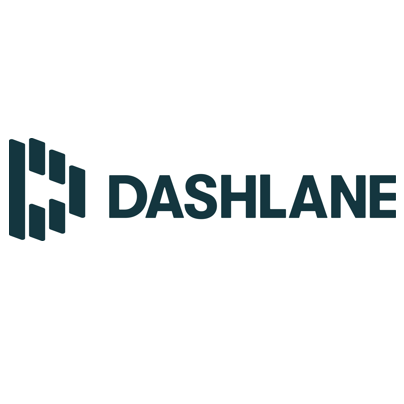 |
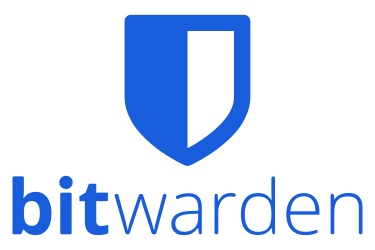 |
|
| Security | Uses AES 256-bit encryption with PBKDF2 SHA-256 and Argon2d | Uses AES 256-bit encryption with PBKDF2 SHA-256 key derivative function |
| Password Storage | Can store and auto-fill niche data like SSH keys, API credentials, and databases | Can store SSH keys, database, and other niche data, but can’t auto-fill it |
| Auto-Save and Fill | The auto-fill function is more seamless and works with complex online forms | The auto-fill function is clunky and inconsistent with complex registration forms |
| Privacy | Has passed multiple audits, a zero-knowledge architecture, and a no-logs policy | Has passed audits, a zero-knowledge architecture, and is open source |
| Ease of Use | Includes a web app instead of desktop apps but is more beginner-friendly | Has native apps for all popular platforms but is slightly less user-friendly |
| Customer Service | Includes support via live chat, email, and an online knowledge base with excellent response times | Doesn’t offer live chat, but its email support is fast, and you can find answers in its online guides |
| Plans and Pricing | The free plan can only hold 25 passwords, and its paid plans are slightly more expensive | The free plan can store unlimited passwords, and its paid plans are relatively cheaper |
What to Look for When Comparing Password Managers
A top password manager satisfies the following criteria I used to compare Bitwarden and Dashlane to decide which is better:
- Security — I checked if the password managers use a zero-knowledge architecture, military-grade encryption standards, and have 2FA methods.
- Password Storage — I used each contender’s password vault, password generator, and auditing tools to measure their performance.
- Auto-Save and Fill — I tested the auto-save and auto-fill functions to see which password manager performs better overall, especially when filling out complex online forms.
- Privacy — I read each password manager’s privacy policy and checked if they’ve cleared independent audits.
- Ease of Use — I looked for feature consistency across apps and tested each password manager to determine which one was user-friendly.
- Extra Features — I evaluated the contenders based on their extra features, such as dark web monitoring, a VPN, and emergency access.
- Customer Service — I contacted the support team using all the support channels and compared the response times.
- Plans and Pricing — I compared each contender’s feature-richness to its price, evaluating whether it’s good value for money.
1. Security — Both Password Managers Are Highly Secure
Bitwarden and Dashlane are both zero-knowledge password managers that ensure complete vault privacy. They use the same industry-standard AES 256-bit encryption, though Dashlane’s key derivative function is more resistant to brute-force attacks. However, Bitwarden’s range of 2FA options provides more customizability.
Encryption — Dashlane Uses a Slightly Better Key Derivative Function
Both Dashlane and Bitwarden use AES 256-bit encryption to protect your data. This is the industry standard used by banks and government agencies. Your master password goes through a key derivation process, creating a unique and extended key based on your password. The AES-256 algorithm then uses this key to encrypt your data before storage.
Encryption and decryption happen locally on your device, as both contenders use a zero-knowledge architecture. This means the companies can’t know your master password or the key that unlocks your encrypted data, so only you can access your vault. However, this also means you must be extra cautious and never forget your master password.
The only difference is that Bitwarden uses the PBKDF2 SHA-256 key derivative function, while Dashlane can switch between PBKDF2 and Argon2d. Argon2 requires a significant amount of memory during the key derivation process. This makes brute-force attacks significantly slower compared to PBKDF2.
Encryption Winner: Dashlane
Two-Factor Authentication (2FA) — Bitwarden Has More 2FA Options
While both password managers offer 2FA for vault security, Bitwarden provides options other than TOTP (time-based one-time passwords), including physical security keys, but doesn’t offer backup codes for 2FA. In contrast, Dashlane only offers TOTP-based 2FA, which makes it less versatile, but it has backup codes for 2FA.
Bitwarden has multiple 2FA options, including authenticator apps, YubiKey, Duo, FIDO2 keys, and email-based verification codes. However, free users can use authenticator apps or email. I set up 2FA within minutes from Bitwarden’s web portal in the ‘Security’ tab. You can also use Bitwarden as a TOTP generator to log in to your accounts.
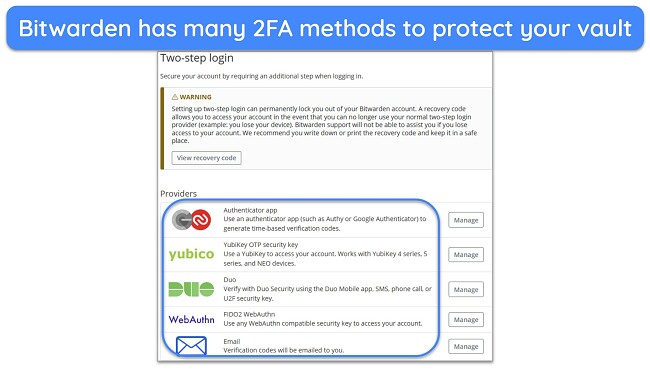
In contrast, Dashlane only supports TOTP-based 2FA via authenticator apps or email. I like that it doesn’t support SMS-based 2FA codes since SMS messages aren’t encrypted. Hackers can use phishing and SIM-swapping attacks to steal your phone number and get the code to enter your vault.

In summary, Bitwarden offers more 2FA options and doesn’t rely solely on internet access. With Dashlane, you can’t access your vault without an internet connection if you’ve activated 2FA for every login attempt. You’ll need connectivity to get the TOTP code from your authenticator app or email.
Two-Factor Authentication (2FA) Winner: Bitwarden
2. Password Storage — Dashlane Has a Versatile Vault, Better Password Audit, and Sharing Features
Unlike Bitwarden, Dashlane’s vault can store niche data like databases, API credentials, and SSH keys. It’s also more organized and easy to use, showing your overall password health score. However, Bitwarden’s password generator can create more complex passwords and has the option to generate passphrases.
Password Vault — Dashlane’s Vault Has More Categories and Is Easier to Use
Dashlane’s vault is more organized and versatile, with separate categories for logins, payments, secure notes, secrets, personal information, IDs, and sharing center. I stored my bank account, credit card number, and several login credentials for my online accounts. When adding items, you can select a category, and Dashlane will automatically organize your vault.
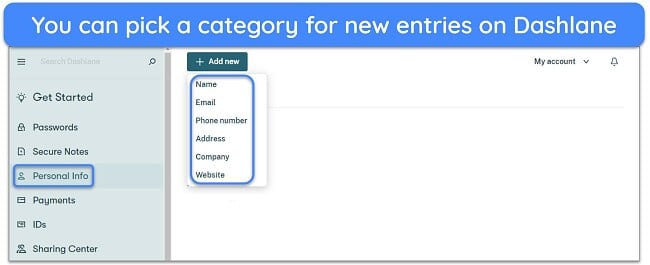
You can store SSH keys, API credentials, and databases in Dashlane’s ‘Secrets’ tab. This is more useful for organizations and tech-savvy users like developers. It can also store niche information in ‘Secure Notes.’ Anything you save as notes isn’t eligible for autofill, but it’s a safe way to store sensitive details and fetch them when needed.
Bitwarden’s vault is less versatile but offers unlimited data on the free and paid plans. It has categories for logins, cards, personal information, and secure notes. Although it doesn’t have specific SSH keys and database categories, you can save this information as notes. I liked that you can organize your data into folders and make shared vaults on the web app.

Overall, I found Dashlane’s vault more beginner-friendly, while Bitwarden’s is cluttered. Importing and exporting passwords is easier with Dashlane’s apps. You can only do so with Bitwarden using the web portal. All these little details make Dashlane more versatile and user-friendly than Bitwarden.
Password Vault Winner: Dashlane
Password Generator — Bitwarden Has a Higher Character Limit and Can Create Passphrases
Bitwarden’s password generator is better because it can create more complex passwords with up to 128 characters. In contrast, Dashlane limits it to 40 characters. However, 40 characters is still more than enough, and many sites don’t allow too many characters in a password. That said, it’s better to have the option of creating a long password.
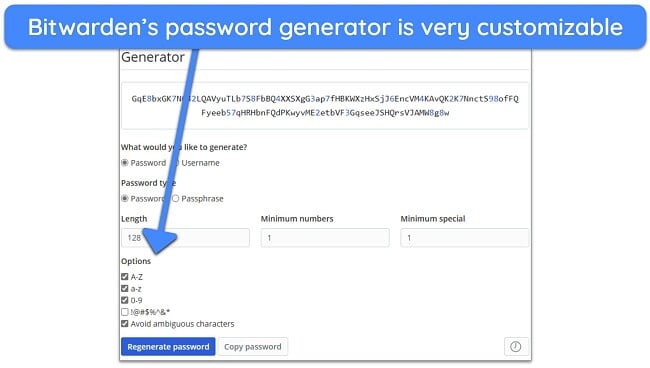
Unlike Dashlane, Bitwarden lets you create passphrases. A passphrase is a string of random words that’s easy to remember but difficult for a computer to guess. Therefore, it’s more secure than a regular password. You can set parameters like length, capitalized letters, and numbers to create passphrases.
Dashlane also lets you choose if you want your password to have letters, digits, and symbols. I like that it can prevent similar characters like ‘0’ and ‘O’ and uppercase ‘i’ (I) and lowercase ‘L’ (l). When signing up on sites, Dashlane’s password generator automatically appears and lets you create a strong password without hassle.
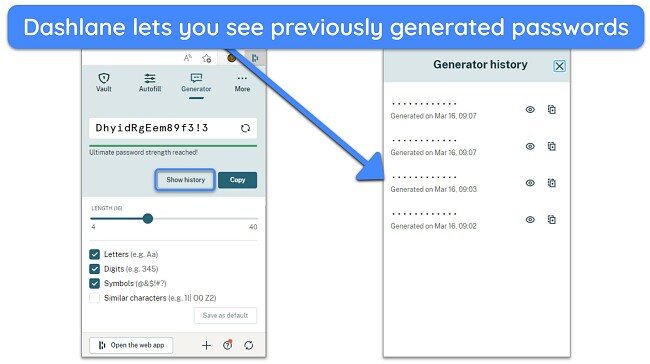
Overall, Bitwarden’s password generator is better. It supports longer-character passwords and passphrases. Both let you set various parameters to create customized passwords. Dashlane’s password generator isn’t available on the web app unless you’re using Safari. In any case, I suggest using its browser extension.
Password Generator Winner: Bitwarden
Password Auditing — Dashlane Shows an Overall Password Health Score
Both options allow you to check if any of your passwords are vulnerable. Unlike Bitwarden, Dashlane shows an overall health score and identifies the exact number of weak, reused, and compromised passwords on the dashboard. It also mentions the websites on which the passwords are vulnerable.
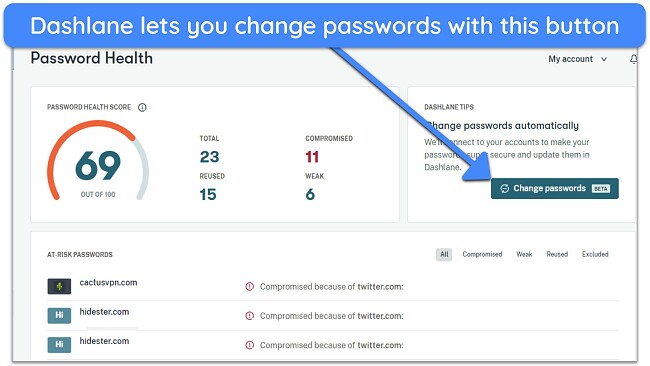
In contrast, Bitwarden’s ‘Report’ feature is a bit cluttered. It identifies your exposed, reused, and weak passwords but doesn’t tell you all the information at a glance. However, I appreciate that it includes breached accounts and prompts you to change passwords on unsecured HTTP sites. You can only check these reports from the web vault, not the Bitwarden app.
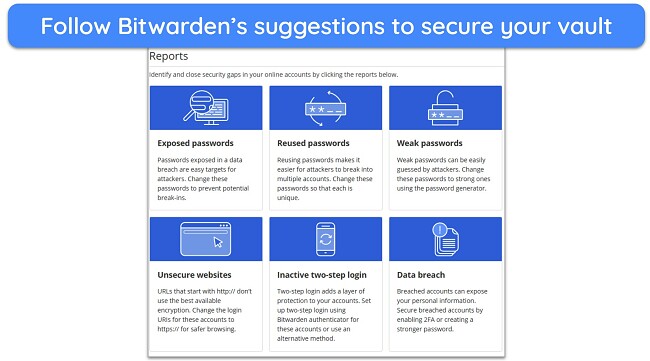
In summary, Dashlane’s password auditor is better and easy to use. I’d rank it equal to 1Password’s WatchTower, which detects breaches accurately. In my tests, Dashlane’s dark web monitoring identified all password leaks accurately through live agents, though you can only protect up to 5 emails per account.
Password Auditing Winner: Dashlane
Password Sharing — Dashlane Lets You Share Items in Your Vault
Unlike Bitwarden, Dashlane lets you share passwords and sensitive data with trusted contacts. I went to the Sharing Center, selected an item, and entered the recipient’s email. The recipient needs to have a Dashlane account to access the shared item. You can give them full rights (view and edit permissions) or limited rights (access only).
Unfortunately, Bitwarden lacks proper password sharing. But at least its ‘Send’ feature lets you share files and texts with anyone. You can keep shareable credentials in text files, but sharing vault items isn’t possible. The file size is capped at 1GB, but you can password-protect the sent information and limit how many times someone can access the file.
Password Sharing Winner: Dashlane
3. Auto-Save and Fill — Dashlane’s Auto-Fill Performs Better
Dashlane’s auto-fill performed better in simple logins and complex forms in my tests. However, both contenders’ auto-save function was equally good. Dashlane lets you pause auto-save and auto-fill on specific sites. So, you can customize it to never auto-fill sensitive banking information. I used it to log in to Stripe and even fill out registration forms.
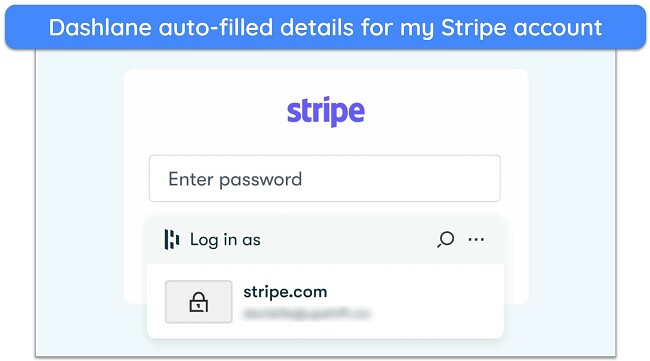
In contrast, Bitwarden’s auto-fill isn’t as good as auto-save. I had to manually save new credentials to the vault when I signed up on sites. While logging in, I had to click the Bitwarden icon in the login fields and select which details I wanted auto-filled. You can fix this by enabling ‘auto-fill on page load,’ but this will always auto-fill the default credentials for that site.
Auto-Save and Fill Winner: Dashlane
4. Privacy — Bitwarden Has a Slight Edge as Its Open Source
While both password managers have privacy-friendly policies and have been audited, Bitwarden wins this round because it’s open source. This makes its code available for anyone to inspect. Additionally, you can self-host Bitwarden and store your data locally if you’re very privacy-conscious. Otherwise, its servers are entirely secure.
Like Bitwarden, Dashlane uses a zero-knowledge architecture, which means it can’t know what you’re storing in your vault. Your data is encrypted and decrypted locally on your device before it goes to Dashlane’s servers. This ensures that your credentials remain encrypted and inaccessible even after a data breach. Here’s how the 2 compare in audits:
| Dashlane | Complies with GDPR and CCPA and has passed the SOC 2 Type 2 audit. |
| Bitwarden | Complies with GDPR, CCPA, and HIPAA and has passed the SOC 2Type 2 and SOC 3 audits. |
Privacy Winner: Bitwarden
5. Ease of Use — Dashlane Has More Useful Extras and Is User-Friendly
Dashlane’s paid plans include a built-in VPN, dark web monitoring, and seamless sharing. While it doesn’t have a native app for Windows and Linux, you can use its lightweight web app and browser extensions on those platforms. In contrast, Bitwarden has native desktop apps, but I found it less user-friendly than Dashlane.
Extra Features — Dashlane Has More Useful Extras
Dashlane is more feature-rich than Bitwarden and includes dark web monitoring and a built-in VPN. While Bitwarden lacks a VPN, it has data breach scanning in its ‘Reports’ feature. Data breach scanning checks past leaks, while dark web monitoring hunts for your info on criminal marketplaces.
You can surf the web anonymously on unsecured public networks with Dashlane’s VPN. While it’s not as good as the top standalone VPNs in 2025, it’s powered by Hotspot Shield and adequate for online privacy and fast speeds. Similarly, dark web monitoring warned me about breached logins so I could take corrective action immediately.
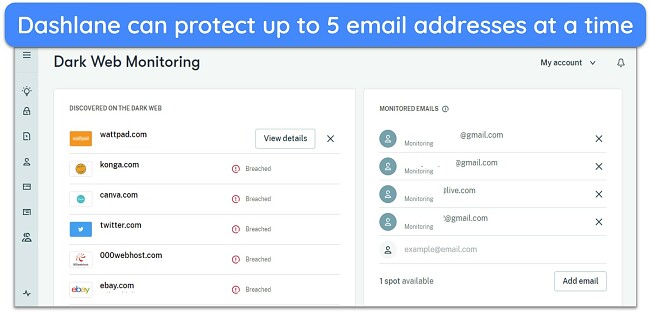
Both password managers include password auditing, a password generator, and passkeys for supported websites. Dashlane lets you share vault items with other users, whereas Bitwarden’s password sharing is limited to text files. Overall, Dashlane wins this round due to its extra features.
Extra Features Winner: Dashlane
Device Compatibility — Bitwarden Has Apps on More Platforms but Dashlane Is More User-Friendly
From a strict device compatibility perspective, Bitwarden wins this round because it has native Windows, macOS, Linux, iOS, and Android apps. In contrast, Dashlane doesn’t have apps for Windows and Linux, so you’ll have to use its extensions or the web app on desktops. However, from an ease-of-use perspective, Dashlane is more intuitive and user-friendly overall.
I installed Bitwarden on my devices in 5 minutes. Its desktop and mobile apps have a straightforward interface, but menus like ‘Reports’ are cluttered. Its auto-fill function only works with the browser extension. On mobile, I had to give accessibility permissions for auto-fill to work. In my experience, Bitwarden’s mobile apps felt more intuitive.
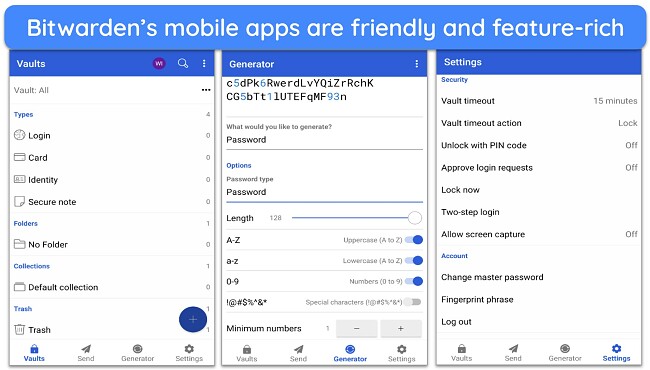
After setting it up, Dashlane showed me a ‘Get Started’ menu and introduced all its features. Installing Chrome, Firefox, Edge, and Safari extensions took 2 minutes. Like Bitwarden, I had to give permission for Dashlane’s auto-fill to work on my Android and iOS devices.
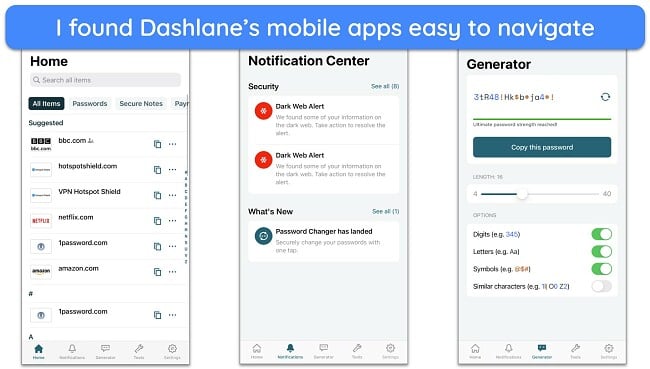
On my Windows PC, I used Dashlane through the Chrome extension and didn’t feel the lack of a native app. However, it’s still better to have a native app than not — that’s why Bitwarden edges out Dashlane in this category.
Device Compatibility Winner: Bitwarden
6. Customer Service — Dashlane Has Live Chat Support
Unlike Bitwarden, Dashlane offers live chat support. I consider live chat a must-have because it’s the quickest way to troubleshoot. Dashlane’s live chat is available from Monday to Friday, 9am to 6pm EST. I connected to a support agent in under a minute and got prompt, detailed responses to all my questions.
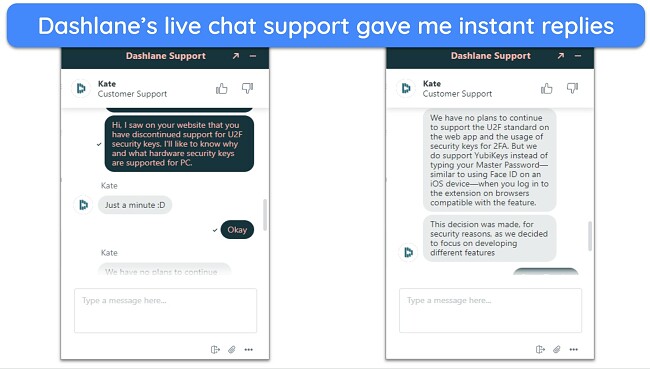
You can also submit a ticket from the Help Center, but it can be time-consuming. I had to wait almost a day for Dashlane’s support team’s email reply. However, the response I received was so thorough that I didn’t need a follow-up. I suggest using ticket support only for very technical issues, while most answers are available on its online knowledge base.
Although Bitwarden lacks live chat support, it partially compensates with fast email support. I tested it thrice and always heard back from the team within an hour. I asked where the ‘Report’ feature was and how to share my passwords with trusted contacts. The team got back to me promptly with precise answers.

Despite the fast email support, I’d still prefer a password manager with live chat support — it’s more convenient to get answers. Therefore, Dashlane is a better choice if you’re a beginner user and have many questions about the service.
Customer Service Winner: Dashlane
7. Plans and Pricing — Bitwarden Is More Affordable and Has a Better Free Plan
Bitwarden’s free plan is quite tempting and has all the core features for your password security. Its plans are also relatively cheaper than Dashlane’s. However, paying slightly extra for Dashlane gives you access to a built-in VPN and dark web monitoring, features I’d like to have for my online privacy.
Price — Bitwarden Has More Affordable Personal, Family, and Business Plans
If you’re budget-conscious, Bitwarden is more affordable than Dashlane. Its free plan includes a password generator, 2FA, Health Reports, and the ‘Send’ feature. The Premium plan only costs $10 per year. It has everything from the free plan, allows 2 user accounts, lets you use security keys for 2FA, and adds contacts for emergency access.
Dashlane’s free plan includes all the core features but only supports 25 stored passwords. The Premium plan removes this cap and includes dark web monitoring, unlimited device support, and a built-in VPN. For a few extra dollars, Dashlane’s Family plan allows up to 10 users with all the premium tier features.
Overall, Bitwarden is a better choice for a single user, especially considering its enticing free plan. However, better affordability doesn’t necessarily mean better value for money. Bitwarden lacks dark web monitoring and a VPN, so if you need those features, Dashlane should be your choice.
Price Winner: Bitwarden
Free Version — Bitwarden’s Free Plan Allows Unlimited Password Storage
On paper, Bitwarden’s free plan is better because it doesn’t cap the number of passwords you can store as Dashlane does at 25. While Dashlane’s free plan only supports 1 device at a time, Bitwarden’s free version has no such constraint. However, I wouldn’t rely on Bitwarden’s free features because they can be limiting. For instance, the ‘Send’ feature is limited to sharing text files, and the breach reports don’t allow you to add emails.
Similarly, 2FA on Bitwarden’s free plan only supports email and authenticator apps. It’s better to get complete protection with Dashlane’s paid plans. However, if you’re budget-conscious, here are a few free password managers worth considering.
Free Version Winner: Bitwarden
Money-Back Guarantee — Dashlane Has a Longer Risk-Free Trial Period
Both contenders offer a free trial and money-back guarantee, but Dashlane provides a 30-day free trial for the Premium plan and a 14-day trial for the Business tier. Personal plans come with a 30-day money-back guarantee, which gives you a total of 60 days to try it completely risk-free. However, the refund policy doesn’t apply to professional plans.
I canceled my Premium account and requested my money back via live chat. The support agent verified my details and approved my request. I got an email confirmation instantly. The funds were credited into my account within 7 working days.
Bitwarden offers a 7-day free trial on its Families and all Business plans. Unfortunately, the Premium plan doesn’t have this, but you can try it risk-free with its 30-day money-back guarantee. The refund policy applies to all plans. My refund ticket was approved after 24 hours, and I received my money back in 10 working days.
Money-Back Guarantee Winner: Dashlane
And the Winner Is… Dashlane
Both Dashlane and Bitwarden are excellent password managers, but Dashlane was the better contender in my tests. Its vault can store more versatile data and allows item sharing. Its auto-fill feature can fill out complex forms and log in to accounts with zero clicks. Dashlane also has better features like a built-in VPN and dark web monitoring, which Bitwarden lacks.
 |
 |
|
| Encryption | Uses AES 256-bit encryption with PBKDF2 SHA-256 and Argon2d key derivative functions | Uses AES 256-bit encryption with a PBKDF2 SHA-256 key derivative function |
| Two-Factor Authentication (2FA) | TOTP codes only (authenticator apps and email) |
|
| Password Vault | Easier to use and can store niche data like SSH keys, API credentials, and databases | Is cluttered and can’t store niche data except in text format as notes |
| Auto-Save and Fill | Auto-save works flawlessly, and auto-fill works seamlessly with complex forms | Auto-save works seamlessly, but auto-fill requires manually selecting credentials at login. |
| Password Generator | Limit of 40 characters and can’t generate passphrases | Limit of 128 characters and can generate passphrases |
| Privacy |
|
|
| Password Auditing | Shows an overall health score, identifies the exact number of vulnerable passwords, and includes dark web monitoring | Doesn’t show an overall health score but identifies accounts on unsecured sites and data breaches |
| Password Sharing | Lets you share vault items with other Dashlane users with adjustable access rights | Doesn’t let you share vault items, but its ‘Send’ feature allows text and file sharing with anyone |
| Ease of Use | More easy to navigate and has user-friendly apps | Can be difficult to use due to interface differences between apps |
| Extra Features |
|
|
| Device Compatibility | Has web apps for Windows and Linux and native apps for macOS, iOS, and Android | Has native apps for Windows, macOS, Linux, iOS, and Android |
| Customer Service |
|
|
| Price | Starts at $4.99/month | Starts at less than $1/month |
| Free Version |
|
|
| Money-Back Guarantee | 30-day money-back guarantee | 30-day money-back guarantee |
However, Bitwarden is more affordable, and its free plan can store unlimited passwords. Unlike Dashlane, it’s open source and more transparent about how it works. Its password generator supports 128-character passwords and passphrases, unlike Dashlane’s.
While Bitwarden’s free plan is enticing, it supports fewer 2FA methods than the paid plans and has limited breach reports. I recommend getting Dashlane because it’s user-friendly, better at auto-filling details, and feature-packed with dark web monitoring and a VPN.
Overall Winner: Dashlane
How to Use Dashlane on Your Device
- Install Dashlane. Open the App Store or Google Play Store, search for Dashlane, and download the app on your phone.
![Screenshot of how to find and install Dashlane's app on the Google Play Store]()
- Create an account. Open the app, tap ‘Get Started,’ and enter the email address you want to set up an account with.
![Screenshot of Dashlane's Get Started menu prompting to enter email address to create a vault]()
- Set up a master password. Enter your master password and start storing passwords on Dashlane.
![Screenshot of setting up a master password when creating a Dashlane vault]()
FAQs About Bitwarden and Dashlane
Is Dashlane better than Bitwarden?
Yes, here’s a 1-minute summary illustrating how it outperformed Bitwarden in my tests. Overall, it’s more user-friendly, has a more versatile vault for storing niche data, and includes useful extras like dark web monitoring and a built-in VPN.
Which password manager is better for Mac, Dashlane or Bitwarden?
Dashlane is better because it’s more user-friendly. Its macOS app includes useful extras like dark web monitoring, a built-in VPN, and more. Bitwarden’s open-source nature makes it a bit less beginner-friendly. Unlike Dashlane, Bitwarden’s macOS app is a bit cluttered and takes some time to get used to.
Which password manager is better for mobile, Dashlane or Bitwarden?
I prefer Dashlane because it has all the features of desktop apps, like dark web monitoring, a VPN, password audit, and a password generator. The only difference is you can’t change your contact email address on the Android app like you can on the iOS app.
Can I export Bitwarden to Dashlane?
Yes, you can import your Bitwarden data on your Dashlane vault with these steps:
- Export Bitwarden data. Open Bitwarden and export the data stored in its vault. This will download a CSV file to your computer.
- Prepare the data. Move Bitwarden’s data to Dashlane’s CSV template so Dashlane can read it properly without any compatibility issues.
- Import data on Dashlane. Import the CSV file to Dashlane using the web and Android apps (the iOS app doesn’t support importing data).

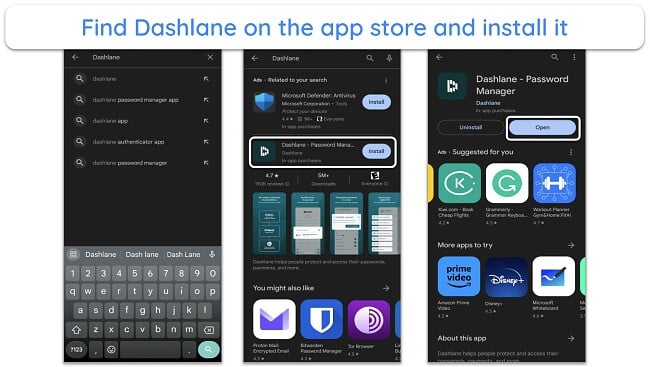
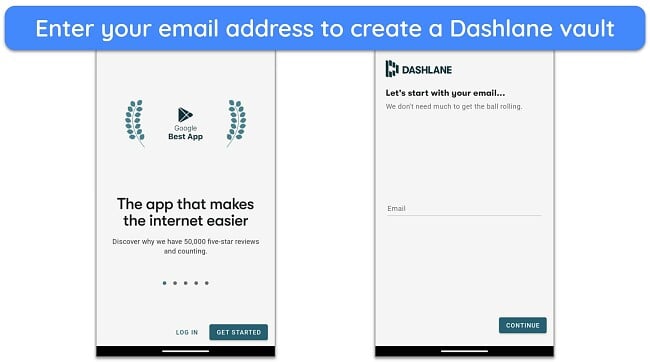
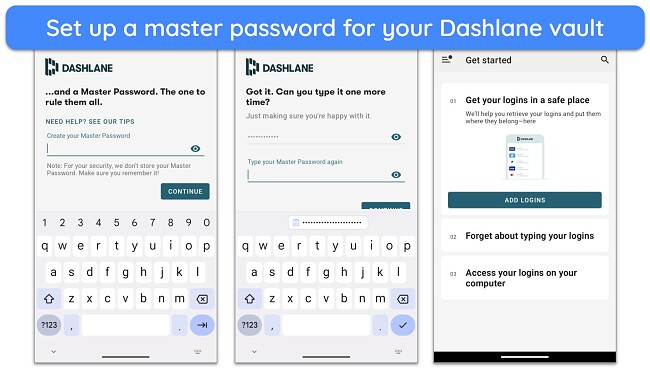
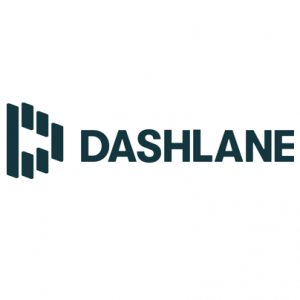
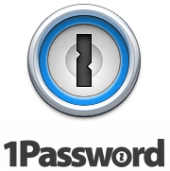


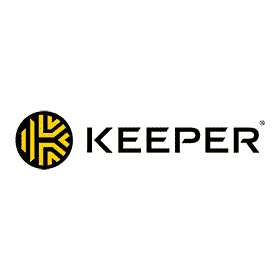

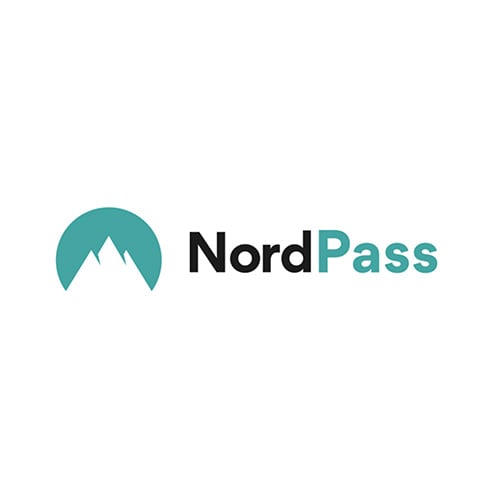


Leave a Comment
Cancel